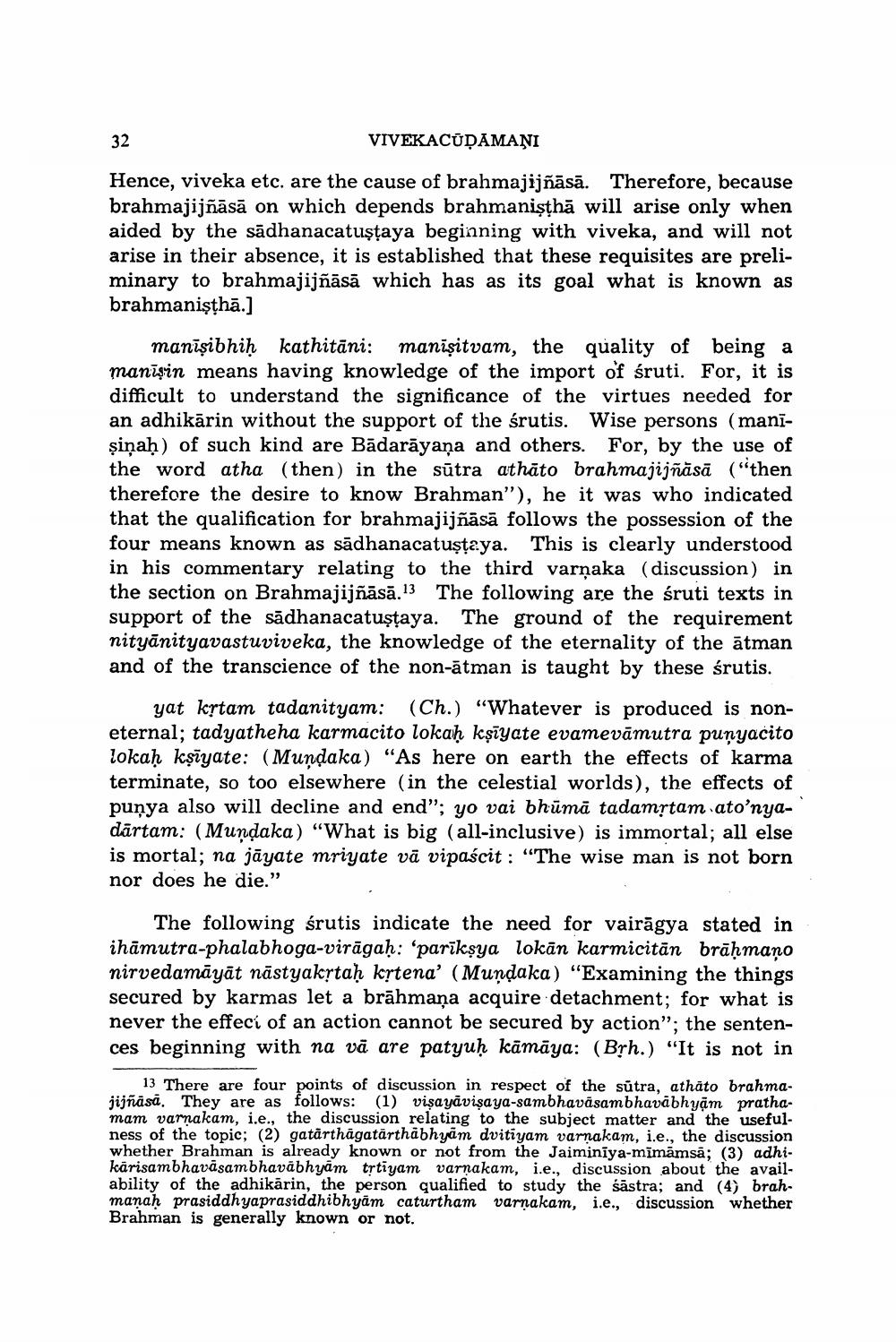________________
32
VIVEKACŪDAMANI
Hence, viveka etc. are the cause of brahmajijñāsā. Therefore, because brahmajijñāsā on which depends brahmanisthā will arise only when aided by the sādhanacatuştaya beginning with viveka, and will not arise in their absence, it is established that these requisites are preliminary to brahmajijñāsā which has as its goal what is known as brahmanişthā.]
manīşibhiḥ kathitāni: manīşitvam, the quality of being a manīşin means having knowledge of the import of śruti. For, it is difficult to understand the significance of the virtues needed for an adhikārin without the support of the śrutis. Wise persons (manīşiņah) of such kind are Bādarāyana and others. For, by the use of the word atha (then) in the sūtra athāto brahmajijñāsā ("then therefore the desire to know Brahman"), he it was who indicated that the qualification for brahmajijñāsā follows the possession of the four means known as sādhanacatuştaya. This is clearly understood in his commentary relating to the third varņaka (discussion) in the section on Brahmajijñāsā.13 The following are the śruti texts in support of the sādhanacatuştaya. The ground of the requirement nityānityavastuviveka, the knowledge of the eternality of the ātman and of the transcience of the non-ātman is taught by these srutis.
yat kytam tadanityam: (Ch.) "Whatever is produced is noneternal; tadyatheha karmacito lokaḥ kṣīyate evamevāmutra punyacito lokah kşīyate: (Mundaka) "As here on earth the effects of karma terminate, so too elsewhere (in the celestial worlds), the effects of punya also will decline and end”; yo vai bhūmā tadam,tam ato'nyadārtam: (Mundaka) “What is big (all-inclusive) is immortal; all else is mortal; na jāyate mriyate vā vipascit : "The wise man is not born nor does he die."
The following śrutis indicate the need for vairāgya stated in ihāmutra-phalabhoga-virāgah: 'parīksya lokān karmicitān brāḥmano nirvedamāyāt nāstyakrtaḥ krtena' (Muņdaka) "Examining the things secured by karmas let a brāhmana acquire detachment; for what is never the effeci of an action cannot be secured by action"; the sentences beginning with na vă are patyuḥ kāmāya: (Brh.) "It is not in
13 There are four points of discussion in respect of the sutra, athăto brahmajijñāsā. They are as follows: (1) vişayāvişaya-sambhavāsambhavabhyām prathamam varnakam, i.e., the discussion relating to the subject matter and the usefulness of the topic; (2) gatarthāgatarthābhyām dvitiyam varnakam, i.e., the discussion whether Brahman is already known or not from the Jaiminiya-mīmāmsā; (3) adhikārisambhavasambhavābhyām trtiyam varnakam, i.e., discussion about the availability of the adhikārin, the person qualified to study the śāstra; and (4) brahmanah prasiddhyaprasiddhibhyam caturtham varnakam, i.e., discussion whether Brahman is generally known or not.




